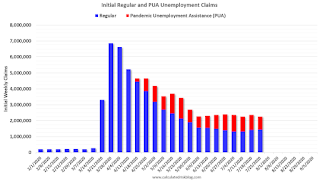by Calculated Risk on 7/30/2020 10:37:00 AM
Thursday, July 30, 2020
Comments on Weekly Unemployment Claims
A few comments:
On a monthly basis, in normal times, most analysts focus on initial unemployment claims for the BLS reference week of the employment report. For July, the BLS reference week was July 12th through the 18th, and initial claims for that week were released last week.
However, continued claims are probably much more useful now. Continued claims released with a one week lag, so continued claims for the reference week were released this week. The week-to-week increase in continued claims suggests some weakness in the July employment report, but continued claims were still down over 2 million from the reference week in June.
Note that a couple of states have not released Pandemic Unemployment Assistance (PUA) claims this week, so the number of PUA claims is too low. However, there may also be processing delays that are impacting the numbers.
Continued claims increased last week to 17,018,000 (SA) from 16,151,000 (SA) the previous week. Continued claims are down 7.9 million from the peak, suggesting a large number of people have returned to their jobs (as the last two employment reports showed). Continued claims NSA increased to 16,881,463 from 16,344,706 the previous week - and the seasonal adjustment may be off this year due to the pandemic.
There are another 12,413,322 people receiving continued PUA.
The following graph shows regular initial unemployment claims (blue) and PUA claims (red) since early February.
 Click on graph for larger image.
Click on graph for larger image.
This was the 19th consecutive week with extraordinarily high initial claims.
It is likely that we are starting to see some layoffs associated with the end of some early Payroll Protection Plan (PPP) participants.
We are probably seeing some layoffs in states with more COVID cases.
Note that these states don't have to lockdown to see a decline in economic activity. As Merrill Lynch economists noted: "Most of the slowdown occurred due to voluntary social distancing rather than lockdown policies."
The following graph shows regular initial unemployment claims (blue) and PUA claims (red) since early February.
 Click on graph for larger image.
Click on graph for larger image.This was the 19th consecutive week with extraordinarily high initial claims.
It is likely that we are starting to see some layoffs associated with the end of some early Payroll Protection Plan (PPP) participants.
We are probably seeing some layoffs in states with more COVID cases.
Note that these states don't have to lockdown to see a decline in economic activity. As Merrill Lynch economists noted: "Most of the slowdown occurred due to voluntary social distancing rather than lockdown policies."


